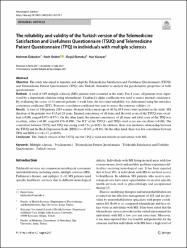| dc.contributor.author | Özkeskin, Mehmet | |
| dc.contributor.author | Özden, Fatih | |
| dc.contributor.author | Ekmekçi, Özgül | |
| dc.contributor.author | Yüceyar, Nur | |
| dc.date.accessioned | 2021-08-10T06:42:05Z | |
| dc.date.available | 2021-08-10T06:42:05Z | |
| dc.date.issued | 2021 | en_US |
| dc.identifier.citation | Özkeskin M, Özden F, Ekmekçi Ö, Yüceyar N. The reliability and validity of the Turkish version of the Telemedicine Satisfaction and Usefulness Questionnaire (TSUQ) and Telemedicine Patient Questionnaire (TPQ) in individuals with multiple sclerosis. Neurol Sci. 2021 Aug 3:1–7. doi: 10.1007/s10072-021-05519-1. Epub ahead of print. PMID: 34342782; PMCID: PMC8328809. | en_US |
| dc.identifier.uri | https://doi.org/10.1007/s10072-021-05519-1 | |
| dc.identifier.uri | https://hdl.handle.net/20.500.12809/9467 | |
| dc.description.abstract | Objective: The study was aimed to translate and adapt the Telemedicine Satisfaction and Usefulness Questionnaire (TSUQ) and Telemedicine Patient Questionnaire (TPQ) into Turkish, thereafter to analyze the psychometric properties of both questionnaires.
Methods: A total of 149 multiple sclerosis (MS) patients were recruited in the study. For 4 years, all patients were supervised by a department clinician using telemedicine. Cronbach's alpha coefficient was used to assess internal consistency. By evaluating the scores of 41 retested patients 1 week later, the test-retest reliability was determined using the intraclass correlation coefficient (ICC). Pearson's correlation coefficient was used to assess the construct validity (r).
Results: A total of 149 patients (103 women, 46 men) with a mean age of 40.9±10.9 years were included in the study. MS duration of the patients was 9.15±6.24 years. Internal consistency of all items and the total score of the TSUQ were excellent (>0.80; ranged 0.971-0.974). On the other hand, the internal consistency of all items and total score of the TPQ was excellent, either (>0.80; ranged 0.878-0.890). The ICC of the TSUQ's and TPQ's total score was excellent (>0.80). The correlation between TSUQ and TPQ was strong (r=0.734, p<0.01). In addition, there was moderate relationship between the TSUQ and the Beck Depression Scale (BDS) (r=-0.363, p<0.01). On the other hand, there was low correlation between TPQ and BDS (r=-0.217, p<0.05).
Conclusion: The Turkish version of the TSUQ and the TPQ is valid and reliable in individuals with MS. | en_US |
| dc.item-language.iso | eng | en_US |
| dc.publisher | Springer | en_US |
| dc.relation.isversionof | 10.1007/s10072-021-05519-1 | en_US |
| dc.item-rights | info:eu-repo/semantics/openAccess | en_US |
| dc.subject | Multiple sclerosis | en_US |
| dc.subject | Psychometrics | en_US |
| dc.subject | Telemedicine Patient Questionnaire | en_US |
| dc.subject | Telehealth Satisfaction and Usability Questionnaire | en_US |
| dc.subject | Turkish version | en_US |
| dc.title | The reliability and validity of the Turkish version of the Telemedicine Satisfaction and Usefulness Questionnaire (TSUQ) and Telemedicine Patient Questionnaire (TPQ) in individuals with multiple sclerosis | en_US |
| dc.item-type | article | en_US |
| dc.contributor.department | MÜ, Köyceğiz Sağlık Hizmetleri Meslek Yüksekokulu, Sağlık Bakım Hizmetleri Bölümü | en_US |
| dc.contributor.authorID | 0000-0001-6593-3758 | en_US |
| dc.contributor.institutionauthor | Özden, Fatih | |
| dc.relation.journal | Neurological Sciences | en_US |
| dc.relation.publicationcategory | Makale - Uluslararası Hakemli Dergi - Kurum Öğretim Elemanı | en_US |


















